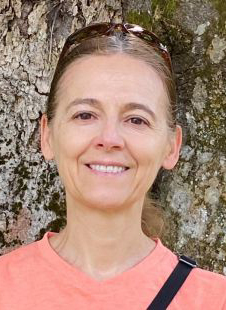Ibáñez, Inés

Inés Ibáñez
Dr. Inés Ibáñez is an ecology professor whose work stands at the forefront of ecological research and environmental sustainability. Her research group investigates the impacts of various global change factors on terrestrial ecosystems, primarily focusing on predicting the resilience and vulnerability of plant communities to various challenges, including climate change, pollution, invasive species, and landscape degradation.
Qiu, T., Aravena, M.C., Ascoli, D., Bergeron, Y., Bogdziewicz, M., Boivin, T., … J. S. Clark. 2023. Mutualist dispersers and the global distribution of masting: mediation by climate and fertility. Nature Plants. 9, 1044–1056, 10.1038/s41477-023-01446-5.
Wang, X. and Ibáñez, I. 2022. The contrasting effects of local environmental conditions on tree growth between populations at different latitudes. Forests (13)429. doi.org/10.3390/f13030429.
Ibáñez, I., L. Petri, D. T. Barnett, E. M. Beaury, D. M. Blumenthal, J. D. Corbin, … B. Bradley. 2023. Combining local, landscape, and regional geographies to assess plant community vulnerability to invasion impact. Ecological Applications. doi.org/10.1002/eap.2821.
Requena-Mullor, J.M., Steiner, A., Keppel-Aleks, G., Ibáñez, I. 2023. Tradeoffs in forest resilience to satellite-based estimates of water and productivity losses. Remote Sensing of Environment, 285. 10.1016/j.rse.2022.113414/
Zonnevylle, H.M., Acharya, K., Potvin, L., Romanski, M., Ibáñez, I. Long-term effects of herbivory on tree growth are not consistent with browsing preferences. CJFR, 53(4), 234-243, 10.1139/cjfr-2022-0221.
Dr. Inés Ibáñez’s early interest in biological systems shaped her journey in the environmental movement. This appreciation for the environment propelled her towards a career dedicated to understanding natural systems.
Dr. Ibáñez completed her bachelor’s degree in biology from Universidad Complutense in Spain in 1994. While in college, she received an ERASMUS Fellowship, which allowed her to study at the University of Wales’ School of Biological Sciences for six months. In 1995, she won a Fulbright Fellowship, allowing her to move to the United States for graduate school, where she attended Utah State University and earned a master of science in Range Sciences in 1998. She completed a Ph.D. in Ecology from Duke University in 2006. Her academic journey paved the way for a career dedicated to understanding forest resiliency in our changing climate.
After completing her master’s degree, Dr. Ibáñez moved to California and worked as a research technician at San Diego State University from 1998 to 1999. She then became a research associate at Duke University until 2000.
Dr. Ibáñez graduated with her Ph.D. in 2006 and received a post-doctoral fellowship as a research scientist at the University of Connecticut. Her postdoc fellowship ended in 2006, and Dr. Ibáñez received a job offer from the University of Michigan. In 2008, she became an Assistant Professor at the University of Michigan, working in the Department of Ecology and Evolutionary Biology and at the School of Natural Resources and Environment. In 2014, Dr. Ibáñez was promoted to Associate Professor.
Dr. Ibáñez’s research portfolio encompasses studies on tree species’ physiological and demographic performance and investigations into landscape dynamics and the broader continental-scale patterns of how ecosystems respond to global change. At the heart of her computational work lies the development of comprehensive models of forest multifunctionality. These models integrate various facets, including processes, products, and drivers affecting forest ecosystems’ atmospheric, vegetation, and soil components.
Dr. Ibáñez’s research aims to uncover the intricate connections, feedback mechanisms, and critical thresholds that drive integrated scientific understanding. Ultimately, this knowledge informs sustainable practices in forest management and conservation, paving the way for more effective strategies in addressing the complex challenges posed by global environmental change.
In addition to her research, Dr. Ibáñez is a dedicated educator. She imparts her knowledge and passion to the next generation of environmental scientists through her teaching and mentorship. Her courses and guidance aim to inspire students to explore the complex world of ecology and environmental sustainability. She teaches forest ecology and management courses, environmental data analysis and modeling, natural resource statistics, and woody plants.
In 2020, she became the Deputy coordinator of the International Union of Forest Research Organizations (IUFRO). Dr. Ibáñez’s research is widely published in scientific journals, contributing to the academic discourse and shaping the future of ecological research. She has published over 80 peer-reviewed articles and contributed to books and book chapters. Dr. Ibáñez also contributes editorially to several journals. Since 2018, she has been the handling editor of PLOS ONE and, since 2023, the Chief Editor for the Global Environmental Change Advances. She has also been a reviewer for other prestigious journals in conservation biology, ecology, and biological sciences.
Dr. Ibanez’s commitment extends beyond the confines of academia. She actively engages with the community, sharing her expertise and insights to promote environmental awareness and conservation efforts. Her passion for sustainability is evident in her research and her efforts to make a tangible difference in the world via education. She is a member of the Ecological Society of America (ESA) and the ESA’s Strategies for Education, Diversity and Sustainability Program (SEEDS).
In 2021, Dr. Ibáñez became a full professor at the University of Michigan. As a faculty member at the University of Michigan, Dr. Ibáñez has demonstrated a commitment to advancing knowledge in natural resource management. Her research group investigates the impacts of various global change factors on terrestrial ecosystems, primarily focusing on predicting the resilience and vulnerability of plant communities to various challenges, including climate change, pollution, introduced species, and landscape degradation.
Dr. Ibáñez’s work at the University of Michigan serves as an inspiration to students, colleagues, and the broader community, driving us all to take action in preserving the natural beauty and resources of our planet.
Dr. Ibáñez has mentored students from the undergraduate level to post-doctoral researchers at the University of Michigan. She mentors with the University of Michigan’s Undergraduate Research Opportunity Program (UROP).
“Work is a lot better when one enjoys the process and not only the result” (2023).
Inés Ibáñez. 2023. University of Michigan. https://seas.umich.edu/sites/default/files/2023-05/InesIbanezCV.pdf. Curriculum Vitae.
Survey and interviews conducted by Justice, Equity, Diversity, and Sustainability Initiative staff. 2022-2023. Yale University-School of the Environment. New Haven, Connecticut.
University of Michigan. 2023. Inés Ibáñez. https://seas.umich.edu/research/faculty/ines-ibanez.